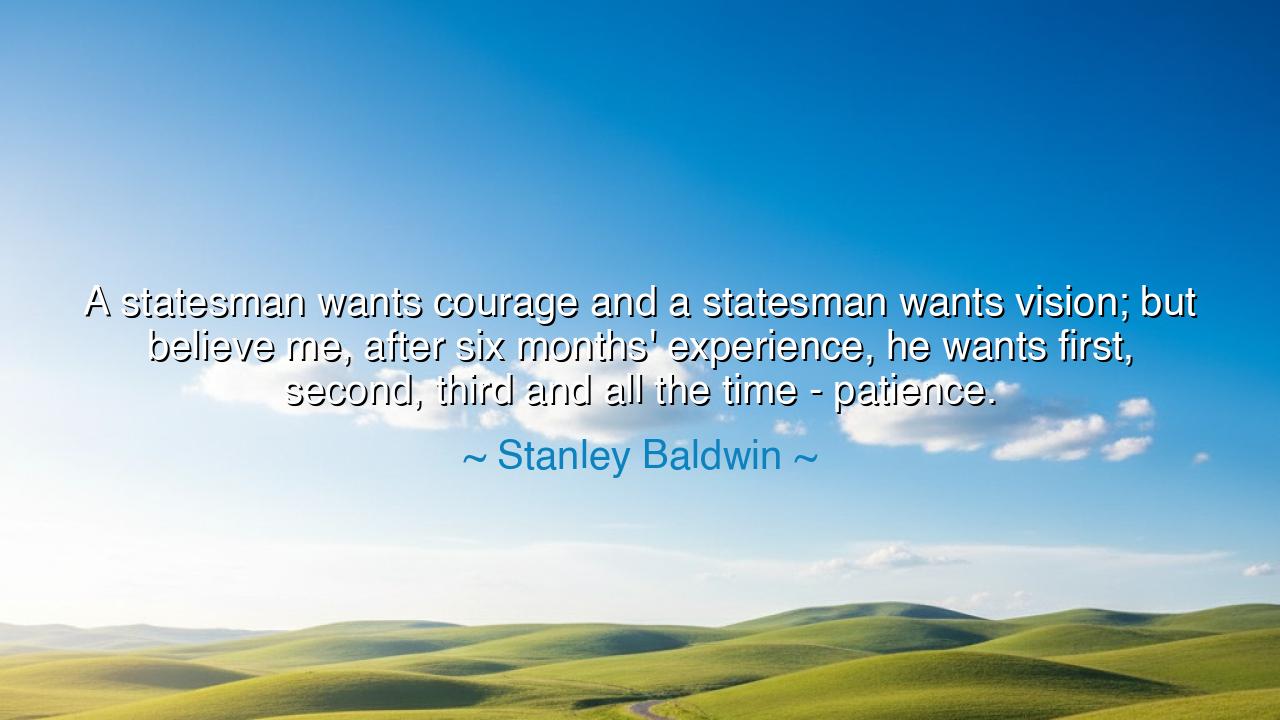
A statesman wants courage and a statesman wants vision; but
A statesman wants courage and a statesman wants vision; but believe me, after six months' experience, he wants first, second, third and all the time - patience.






When Stanley Baldwin, the British Prime Minister of the early twentieth century, said, “A statesman wants courage and a statesman wants vision; but believe me, after six months’ experience, he wants first, second, third and all the time—patience,” he spoke from the weary wisdom of one who had wrestled with the burdens of power. His words rise from the heart of experience, from the sleepless nights of governance where ideals clash with reality, and where progress—though dreamed in grandeur—must be shaped by the slow hand of time. Courage and vision, noble though they are, may ignite beginnings; but it is patience, steady and unyielding, that carries a nation through its trials.
Baldwin lived in an era between storms—the years after the Great War and before the Second. He stood amid a people torn between memory and fear, between old glories and new uncertainties. He knew well that a leader must see far and stand firm, yet he also learned that even the greatest vision falters when it lacks the endurance to wait. The machinery of government, the will of a people, and the course of destiny all move slowly, like rivers carving stone. Thus, Baldwin’s words are not merely political—they are universal. For whether one governs a nation, a home, or oneself, the highest virtue is not haste, but endurance, the wisdom to labor calmly while the fruit ripens unseen.
In the ancient world, Marcus Aurelius, emperor and philosopher, taught this same truth. Surrounded by wars, betrayals, and the ceaseless demands of empire, he wrote in his meditations, “No great thing is created suddenly.” He knew that to lead others, one must first govern one’s own impulses—the urge to rush, to conquer, to demand instant reward. The true statesman, like the true philosopher, must hold steady amid frustration and doubt. For patience is not inaction; it is action refined by restraint. It is the quiet strength that transforms chaos into order, that turns visions into enduring reality.
Consider the story of Abraham Lincoln, who led his divided nation through civil war. His courage was unquestioned, his vision vast—to preserve the Union and end the curse of slavery. Yet it was his patience that made his greatness possible. He bore insults without reply, defeats without despair. He waited through endless political storms, never allowing anger or haste to cloud his purpose. Many demanded quick vengeance or sweeping decisions; Lincoln waited for the right hour, the right law, the right word. When freedom at last came, it came not as an act of impulse, but as the result of a long, patient faith in justice. His life proves Baldwin’s truth: that the heart of leadership is endurance—the will to stand when others waver.
Patience, then, is not the meekness of those who shrink from struggle; it is the steadfastness of those who dare to see beyond the moment. The impatient man is a slave to time; the patient man becomes its master. The impatient leader burns brightly and burns out; the patient one endures the long night, guiding his people by the steady flame of wisdom. In every realm—whether politics, art, love, or labor—patience is the soil from which all greatness grows. Without it, courage turns to recklessness and vision to vanity.
Baldwin’s wisdom also warns us of our age, where haste is crowned as virtue and speed mistaken for progress. We wish to harvest before we have planted, to command results before we have earned them. But the world’s most enduring works—cathedrals, civilizations, character itself—are built by slow and deliberate hands. To be a statesman of one’s own life, to rule one’s destiny with grace, one must learn this divine rhythm of patience: to act when the time is right, and to wait when it is not.
So, my children of ambition and flame, learn from the counsel of Baldwin and the wisdom of the ancients: cultivate patience as your shield and your guide. When the world provokes you to haste, breathe and hold firm. When your dreams delay their arrival, tend them quietly with faith. For as the seasons teach us, even the mightiest oak begins as a seed that waits beneath the earth. Be courageous, be visionary—but above all, be patient. For courage begins the journey, vision charts the course, but patience brings you home.






AAdministratorAdministrator
Welcome, honored guests. Please leave a comment, we will respond soon